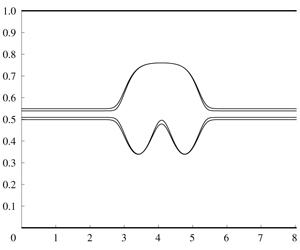Article contents
Strongly nonlinear effects on internal solitary waves in three-layer flows
Published online by Cambridge University Press: 25 November 2019
Abstract

We consider a strongly nonlinear long wave model for large amplitude internal waves in a three-layer flow between two rigid boundaries. The model extends the two-layer Miyata–Choi–Camassa (MCC) model (Miyata, Proceedings of the IUTAM Symposium on Nonlinear Water Waves, eds. H. Horikawa & H. Maruo, 1988, pp. 399–406; Choi & Camassa, J. Fluid Mech., vol. 396, 1999, pp. 1–36) and is able to describe the propagation of long internal waves of both the first and second baroclinic modes. Solitary-wave solutions of the model are shown to be governed by a Hamiltonian system with two degrees of freedom. Emphasis is given to the solitary waves of the second baroclinic mode (mode 2) and their strongly nonlinear characteristics that fail to be captured by weakly nonlinear models. In certain asymptotic limits relevant to oceanic applications and previous laboratory experiments, it is shown that large amplitude mode-2 waves with single-hump profiles can be described by the solitary-wave solutions of the MCC model, originally developed for mode-1 waves in a two-layer system. In other cases, however, e.g. when the density stratification is weak and the density transition layer is thin, the richness of the dynamical system with two degrees of freedom becomes apparent and new classes of mode-2 solitary-wave solutions of large amplitudes, characterized by multi-humped wave profiles, can be found. In contrast with the classical solitary-wave solutions described by the MCC equation, such multi-humped solutions cannot exist for a continuum set of wave speeds for a given layer configuration. Our analytical predictions based on asymptotic theory are then corroborated by a numerical study of the original Hamiltonian system.
Information
- Type
- JFM Papers
- Information
- Copyright
- © 2019 Cambridge University Press
References
- 32
- Cited by

